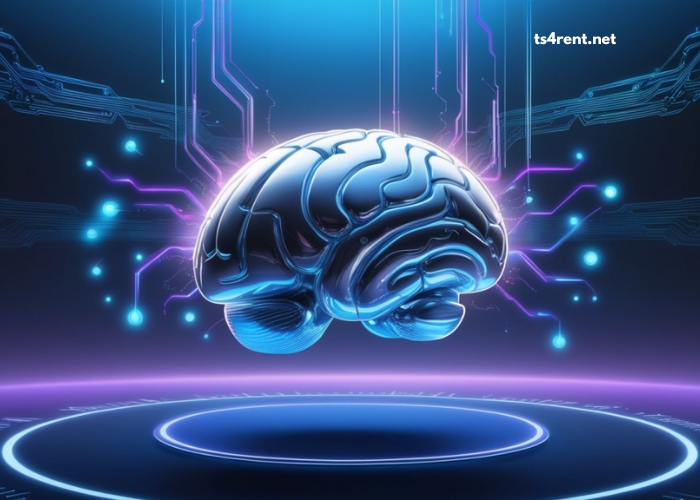Artificial Intelligence (AI) has been rapidly transforming industries across the globe, ushering in a new era of automation, efficiency, and innovation. As we look ahead, AI technology is poised to redefine the way businesses operate, how employees work, and even the fundamental structures of entire industries. From manufacturing to healthcare and finance to retail, AI is shaping the future of every sector. This article delves into the profound effects of AI technology on future industries, highlighting its potential, challenges, and the opportunities it presents.
Understanding Artificial Intelligence (AI)
Before diving into the impact of AI on various industries, it’s essential to grasp what AI entails. Artificial Intelligence refers to machines or systems designed to simulate human intelligence processes, such as learning, reasoning, problem-solving, perception, and even decision-making. Through machine learning (ML) and deep learning (DL), AI can process massive amounts of data and generate insights, predictions, and solutions faster and more accurately than humans.
AI has evolved from simple automation tools to sophisticated systems that can mimic cognitive functions, making it a driving force behind innovations in multiple sectors.
The Role of AI in Future Industries
AI is no longer a futuristic concept—it’s actively transforming industries today. But as we look to the future, its influence will only grow, bringing with it new possibilities and challenges. Below are key sectors that will see significant changes due to AI.
1. AI in Healthcare: Revolutionizing Patient Care
Healthcare is one of the industries where AI is set to have the most transformative impact. With AI technologies like machine learning algorithms, natural language processing (NLP), and robotics, the healthcare sector is becoming more efficient, cost-effective, and patient-centered.
AI-powered Diagnostics and Personalized Medicine
AI’s ability to analyze large datasets quickly and accurately makes it an invaluable tool for diagnostics. Machine learning models can detect patterns in medical images, such as X-rays and MRIs, helping doctors identify conditions like cancer, heart disease, and neurological disorders at early stages. Furthermore, AI algorithms can predict patient outcomes and suggest personalized treatment plans based on genetic, environmental, and lifestyle factors, leading to more precise and effective therapies.
Robotic Surgery and Assistance
Robotic systems powered by AI, like the da Vinci surgical system, have already begun to revolutionize surgery by providing enhanced precision, reducing human error, and minimizing recovery times for patients. In the future, AI will likely play a larger role in autonomous surgeries, where robots can perform complex procedures with minimal human intervention.
2. AI in Manufacturing: Smart Factories and Automation
The manufacturing industry is undergoing a significant shift due to the integration of AI technologies. The rise of Industry 4.0, characterized by smart factories, advanced robotics, and IoT (Internet of Things), is pushing the boundaries of efficiency and production capabilities.
Predictive Maintenance and Reduced Downtime
AI-driven predictive maintenance solutions are a game changer for manufacturing. By leveraging machine learning algorithms, manufacturers can predict when machinery or equipment is likely to fail, allowing for proactive maintenance. This reduces costly downtime, enhances operational efficiency, and improves the lifespan of equipment.
Automation and Robotics
AI-powered robots and automated systems are increasingly being used on production lines. These robots can handle repetitive tasks, assemble products, and even adapt to changes in the production process in real time. As AI improves, we can expect robots to become more autonomous, flexible, and capable of working alongside human workers in collaborative environments.
3. AI in Finance: Transforming Banking and Investment
AI technology is reshaping the finance industry by automating tasks, improving decision-making, and enhancing security.
AI in Risk Assessment and Fraud Detection
In the finance sector, AI is used to detect unusual patterns in transactions, helping banks and financial institutions identify potential fraudulent activity. AI’s ability to analyze vast amounts of data quickly and accurately enables it to flag suspicious transactions and prevent financial crimes before they occur. Additionally, AI-powered risk assessment tools can help lenders assess the creditworthiness of borrowers with more precision, reducing the likelihood of defaults.
Robo-Advisors and Wealth Management
AI is also changing the landscape of wealth management through robo-advisors. These AI-powered platforms provide personalized investment advice by analyzing an individual’s financial situation, goals, and risk tolerance. Robo-advisors make wealth management more accessible to a broader audience, offering lower fees and automated portfolio management.
4. AI in Retail: Enhancing Customer Experience and Operational Efficiency
AI is making waves in the retail industry, where it’s being used to enhance customer experiences, streamline operations, and optimize supply chains.
Personalized Shopping Experiences
AI enables retailers to offer personalized shopping experiences by analyzing customer data, such as purchase history and browsing habits. This allows retailers to recommend products tailored to individual preferences and needs. Virtual shopping assistants and chatbots, powered by AI, can also help customers navigate online stores, answer questions, and assist with purchases, further improving the shopping experience.
Inventory Management and Demand Forecasting
AI plays a crucial role in improving inventory management and demand forecasting. By analyzing historical sales data, market trends, and other factors, AI systems can predict customer demand with a high degree of accuracy. This helps retailers optimize stock levels, reduce waste, and ensure that products are available when customers need them.
5. AI in Transportation: Autonomous Vehicles and Traffic Management
The transportation industry is being significantly transformed by AI, particularly through advancements in autonomous vehicles and traffic management systems.
Self-Driving Cars and Trucks
AI is the backbone of autonomous vehicle technology. Companies like Tesla, Waymo, and others are making strides in developing self-driving cars and trucks. These vehicles rely on AI to process data from cameras, sensors, and LiDAR to make real-time decisions and navigate complex environments without human intervention. As AI continues to evolve, we can expect autonomous vehicles to become more widespread, improving road safety and reducing traffic congestion.
AI in Traffic Management
AI is also being used to improve traffic management systems. By analyzing real-time traffic data, AI can optimize traffic light patterns, manage congestion, and reduce travel times. AI-powered systems can also help predict traffic accidents and reroute vehicles, enhancing the efficiency of urban transport networks.
Challenges and Considerations
While the impact of AI on future industries is undoubtedly transformative, there are several challenges and considerations to address.
1. Ethical Implications of AI
As AI continues to permeate various industries, ethical concerns regarding its use are becoming more pressing. Issues such as data privacy, algorithmic bias, and job displacement must be carefully addressed. Ensuring that AI systems are transparent, fair, and accountable is crucial to their successful integration into society.
2. Job Displacement and the Future of Work
The rise of AI-powered automation raises concerns about job displacement. While AI can enhance productivity and create new job opportunities, it may also render certain jobs obsolete. Industries that rely on manual labor or routine tasks are particularly vulnerable. Preparing the workforce for the future of work through reskilling and upskilling initiatives will be essential in mitigating these impacts.
3. Security Risks and AI Vulnerabilities
As AI systems become more integrated into critical industries, the risks associated with cybersecurity and AI vulnerabilities grow. AI-driven systems can be targeted by malicious actors who seek to exploit weaknesses for financial or political gain. Ensuring that AI technologies are secure and resilient against cyber threats is paramount.
The Future Outlook: AI as an Industry-Defining Force
As AI technology continues to evolve, it will increasingly shape the future of industries. The next decade is likely to bring even more disruptive changes, with AI playing a central role in innovation, competition, and economic growth.
Conclusion
The impact of AI on future industries is undeniable. From healthcare and manufacturing to finance, retail, and transportation, AI is revolutionizing how businesses operate and deliver services. While challenges remain, the potential benefits of AI—such as increased efficiency, improved decision-making, and enhanced customer experiences—offer a compelling vision of the future. As AI continues to develop, it will undoubtedly drive progress in ways we can only begin to imagine, reshaping industries for years to come.
For industries to fully capitalize on the potential of AI, they must invest in research, embrace innovation, and address the ethical and societal challenges that accompany these technological advancements. The AI-driven future is coming—industries must be prepared to adapt and thrive in this rapidly changing landscape.





